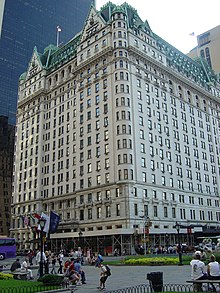Plaza Agreement
The Plaza Agreement is an agreement between the representatives of the G5 countries ( France , Federal Republic of Germany , Japan , USA and Great Britain ), which was concluded on September 22, 1985 in the Plaza Hotel in New York . In this agreement, the participants agreed to achieve a devaluation of the US dollar against the yen and the German mark through controlled influence on the international currency markets .
reasons
The background to the agreement was the steady appreciation of the US dollar on the international currency markets since the early 1980s. While the dollar exchange rate against the D-Mark in 1980 was 1.82 DM, it rose to 2.94 DM by 1985. The restrictive monetary policy at the time and the high budget deficit (approx. 3.5% of the GNP ), combined with an increased government demand for loans, led to rising interest rates in the US, which attracted investors and increased the demand for US dollars. The rising dollar rate made imported products cheaper in the USA, while American products became more expensive abroad. The US trade deficit , which was still moderate in 1980 at 19.8 billion dollars, was already 52.4 billion dollars in 1983 and rose to 152.1 billion dollars by 1987. In addition, the American government came under pressure from its own industry, which demanded better protection against foreign imports and more stability in exchange rates.
Consequences of the Agreement
Over the next two years, the dollar fell by around 50%, the yen and the German mark appreciated, and the US was able to reduce the trade deficit with Western Europe . A reduction in the trade deficit with Japan was not achieved, however, as Japanese companies reacted to the dollar devaluation with price cuts. On the other hand, the exchange rate tensions led to a recession in Japan, so that imports there fell. As a result, the trade deficit with Japan increased even further.
After the two-year devaluation phase, the governments of the G5 in 1987 took the view that exchange rates had stabilized at a realistic level and agreed in the Louvre Agreement to support the existing exchange rates as best they could.
The appreciation of the yen resulting from the Plaza Agreement is seen as a cause of the following Japanese bubble economy .
Web links
swell
- ↑ Archived copy ( Memento of the original from September 29, 2007 in the Internet Archive ) Info: The archive link was inserted automatically and has not yet been checked. Please check the original and archive link according to the instructions and then remove this notice.
